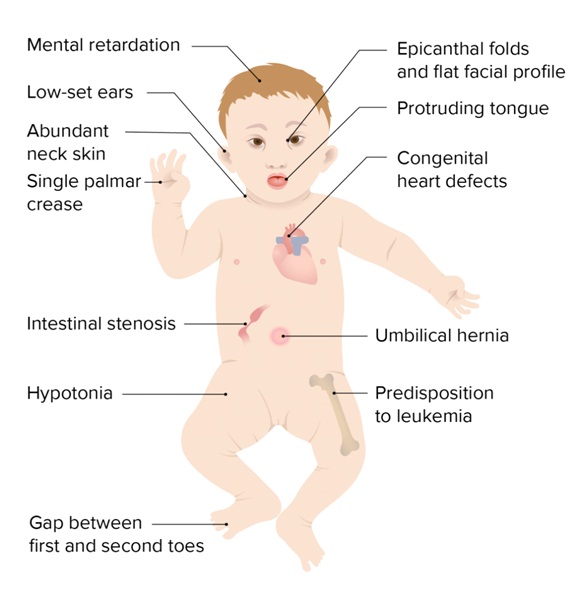Unlocking Uniqueness: Mosaic Down Syndrome Symptoms Explored
Introduction
Mosaic Down Syndrome, a rare genetic condition, presents a mosaic pattern of typical and atypical cells, leading to a unique manifestation of Down syndrome. Understanding the intricacies of its symptoms is crucial to provide adequate support and foster inclusivity.
Definition of Mosaic Down Syndrome
Mosaic Down Syndrome is a genetic condition caused by the presence of an extra partial or full copy of chromosome 21 in some, but not all, cells.
Importance of Understanding Mosaic Down Syndrome Symptoms
Understanding mosaic Down syndrome symptoms holds immense significance in providing tailored care and support for individuals affected by this condition. As mosaic Down syndrome presents a spectrum of unique characteristics, from physical traits to cognitive and behavioral differences, grasping these symptoms is crucial. This understanding allows for personalized interventions, educational strategies, and emotional support, fostering an inclusive environment that celebrates the individual strengths and challenges of those with mosaic Down syndrome. By acknowledging and comprehending these distinct symptoms, we pave the way for a more empathetic and supportive society.
Understanding Mosaic Down Syndrome

What Sets Mosaic Down Syndrome Apart?
Unlike typical Down syndrome, mosaic variation displays different physical and developmental characteristics.
Genetic Basis of Mosaic Down Syndrome
Mosaic Down Syndrome arises due to an error in cell division, resulting in an additional copy of chromosome 21 in some cells.
Varied Symptomatology in Mosaic Down Syndrome
The symptoms range from mild to moderate, influencing physical, cognitive, and behavioral traits differently in each individual.
Exploring Mosaic Down Syndrome Symptoms

Physical Symptoms
Discussing the range of physical traits, such as facial features, heart defects, and other medical concerns present in mosaic Down syndrome.
Cognitive and Developmental Variations
Understanding the spectrum of cognitive abilities, such as learning, memory, and developmental milestones seen in mosaic Down syndrome.
Behavioral Characteristics
Exploring unique behavioral traits commonly found in individuals with mosaic Down syndrome.
Diagnosis
1. Genetic Testing: Diagnosis often involves genetic testing, such as chromosomal analysis. This testing aims to identify the presence of an additional partial or full copy of chromosome 21 in some but not all cells. Genetic tests like karyotyping or FISH (fluorescence in situ hybridization) help in confirming the mosaic pattern.
2. Physical Examinations: Healthcare professionals conduct physical exams to observe and identify specific physical traits associated with Down syndrome, such as facial features and other possible medical concerns.
3. Medical History Assessment: Gathering a comprehensive medical history from the individual and their family helps in understanding potential risk factors and informs the diagnostic process.
Management

1. Therapeutic Interventions: Upon diagnosis, individuals with mosaic Down syndrome may benefit from various therapeutic interventions. These can include speech and occupational therapy, physical therapy, and educational support tailored to their specific needs.
2. Support Services: Access to support services is crucial. This might include guidance from genetic counselors, pediatric specialists, and other healthcare professionals. Additionally, early intervention programs help in providing developmental and educational support from a young age.
3. Holistic Care Approach: Individuals with mosaic Down syndrome often require a holistic approach to their care, addressing their physical, cognitive, and emotional needs. Regular medical check-ups, specialized educational programs, and community support all play vital roles in their management.
4. Family Involvement: It’s essential to involve and support the families of individuals with mosaic Down syndrome. Offering guidance, resources, and emotional support to family members helps them better understand the condition and navigate the necessary support networks.
Read More about Childhood Dementia Insights
Destigmatizing Mosaic Down Syndrome

Importance of Awareness
Addressing the significance of raising awareness to promote inclusivity and understanding of conditions like mosaic Down syndrome is pivotal in creating an inclusive and empathetic society. Increased awareness fosters a more accepting environment where differences are celebrated rather than stigmatized. By educating people about the unique characteristics and challenges faced by individuals with mosaic Down syndrome, we encourage a shift in perspective, leading to greater acceptance and support. This heightened awareness not only aids in dispelling misconceptions but also promotes inclusivity, ensuring that individuals with mosaic Down syndrome are valued and embraced for their unique strengths. It empowers communities to provide the necessary resources, support, and opportunities that allow everyone to thrive, irrespective of their abilities or differences. Ultimately, this collective awareness contributes to a more compassionate and understanding world..
Shifting Perspectives and Celebrating Differences

Encouraging a shift in societal attitudes toward acceptance and celebration of diversity is essential for fostering a more inclusive and compassionate community. Embracing diversity, including conditions like mosaic Down syndrome, involves moving beyond mere tolerance to genuine acceptance. This shift entails acknowledging and appreciating the unique strengths and contributions of individuals with varying abilities.
By promoting a culture that celebrates diversity, we create an environment where everyone feels valued and respected for who they are. It involves challenging preconceived notions and stereotypes, encouraging empathy, and promoting inclusivity in all aspects of life.
Celebrating diversity doesn’t just benefit individuals with conditions like mosaic Down syndrome; it enriches society as a whole. It widens our perspectives, fosters creativity, and builds a more vibrant and dynamic community. By embracing differences and promoting an inclusive culture, we create a society that thrives on empathy, understanding, and the celebration of the diverse tapestry of humanity. This shift in societal attitudes not only benefits individuals with mosaic Down syndrome but contributes to a more cohesive and harmonious world for everyone.
Research and Future Outlook
Ongoing Research Initiatives
Understanding mosaic Down syndrome is essential in providing tailored care and support to those affected. This genetic condition presents a unique pattern of atypical and typical cells, resulting in a varied manifestation of Down syndrome. By comprehending the intricacies of its symptoms, individuals can receive targeted interventions and support. This understanding empowers families, educators, and healthcare professionals to offer personalized assistance, allowing individuals to thrive based on their unique strengths and challenges. Embracing the diverse needs of those with mosaic Down syndrome cultivates an inclusive environment that celebrates individuality and fosters a supportive community.
Potential Advancements and Outlook for the Future
The future outlook for mosaic Down syndrome shows promise through ongoing research, potential medical advancements, and evolving social attitudes. Researchers aim to develop targeted therapies and improved diagnostic methods, fostering hope for better quality of life for affected individuals. Advancements in inclusive education and community support offer prospects for increased acceptance and understanding. As awareness grows, the future holds potential for a more inclusive and supportive society that celebrates the uniqueness of individuals with mosaic Down syndrome.
Conclusion
In conclusion, understanding mosaic Down syndrome symptoms is crucial for tailored support and fostering an inclusive society. Embracing the uniqueness of individuals with mosaic Down syndrome paves the way for a more accepting and understanding community.
- Are all individuals with mosaic Down syndrome the same? No, each individual with mosaic Down syndrome is unique. The mosaic pattern results in varying combinations of typical and atypical cells, leading to a spectrum of symptoms. This diversity means that individuals may display different physical, cognitive, and behavioral characteristics, even within the same diagnosis.
- How is mosaic Down syndrome diagnosed? Diagnosing mosaic Down syndrome often involves genetic testing, such as chromosomal analysis. This testing helps identify the presence of an additional partial or full copy of chromosome 21 in some but not all cells. Physical examinations and medical history assessments may also contribute to diagnosis.
- What support resources are available for families of individuals with mosaic Down syndrome? Families of individuals with mosaic Down syndrome can access a range of support resources. These may include early intervention programs, specialized educational support, access to healthcare professionals such as genetic counselors and therapists, as well as support groups that provide emotional support, guidance, and information.
- Can individuals with mosaic Down syndrome lead fulfilling lives? Yes, individuals with mosaic Down syndrome lead fulfilling lives. With appropriate support, education, and healthcare, many individuals reach various milestones and engage actively in their communities. Each person’s journey is unique, but with the right resources and support, individuals can achieve their potential and contribute meaningfully to society.
- What does the future hold for research on mosaic Down syndrome? Ongoing research continues to focus on understanding the complexities of mosaic Down syndrome. Scientists aim to identify new therapeutic interventions, improve diagnostic methods, and enhance support services. The hope is that this research will contribute to better tailored interventions, increased awareness, and a more inclusive society for individuals with mosaic Down syndrome.








 Viesearch - The Human-curated Search Engine
Viesearch - The Human-curated Search Engine

6 Comments